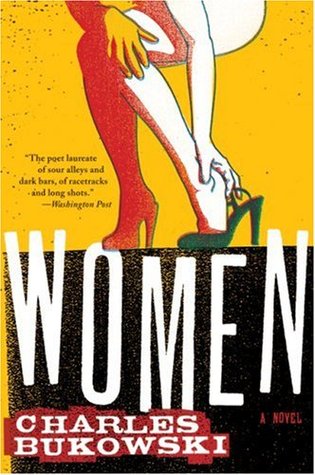Women, by Charles Bukowski
 I wish I would have read Women when I was a teenager. I would have learned then that there is no shame in being a man and wanting women and not caring about their neuroses. They might complain about it, but that's their point of view. And in a way, that's the only good thing this book has to teach: how to live unapologetically, accepting who you are. Other than that, the main character, an alter ego of Charles Bukowski, is an old writer who drinks all day, fucks whatever he finds and gambles at the horse race track. By his own admission he only writes so he can do these three things.
I wish I would have read Women when I was a teenager. I would have learned then that there is no shame in being a man and wanting women and not caring about their neuroses. They might complain about it, but that's their point of view. And in a way, that's the only good thing this book has to teach: how to live unapologetically, accepting who you are. Other than that, the main character, an alter ego of Charles Bukowski, is an old writer who drinks all day, fucks whatever he finds and gambles at the horse race track. By his own admission he only writes so he can do these three things.
The prose is almost without introspection, just what people did and what they said, but when the character delves into analysing the situations, there are some brilliant passages, some hilariously funny. Imagine someone going through life like in a third person game. They see themselves do things, things that they just feels like doing, and feel little to no shame or responsibility. The entire book is dedicated to the women in his life which are, although very different from one another, easy, sexual, desperate and sometimes downright crazy. He never judges them, except for their sexual technique or pussy size and shape, but he never gets stuck with any of them, even the ones he is in love with.
What I liked about the character is that he is never violent. Like a Big Lebowski kind of guy, he sails through life like a goose in water; nothing sticks. He loves and leaves, he cares but up to a point, he tries to be good to the people around him, but only after he takes care of his own needs. I had a friend like that once. He was caring and amazingly charismatic, but never right or reliable. Another similar character was Hank Moody, from Californication, which I really loved in the first two seasons.
Did I love the book? I can't say that I did, but I did like it a lot. It was different from other things I've read and what I feel is probably gratefulness for having such a raw depiction of everything the character/the writer lived and felt. So many books are trying too hard to be smart and fail to pass that first bar of characters laid bare so the reader can fully understand them. There is absolutely no story in this other than the life of Henry Chinaski.
Something else that I have to say is that the book is something that should be read in this period. It goes back to the basic essence of man and woman, without caring one iota about politics or correctness or trying to absolve the main character in any way. Just like the guy lives in the book, the writing is take it or leave it.
Comments
Be the first to post a comment